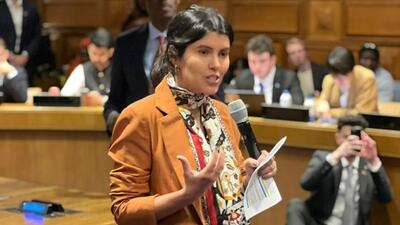
The role of trade and investment policies to transition to a circular economy
Transitioning to a circular economy requires tailored trade and investment policies
Trade and investment policies need to be tailored to each country and sector of the economy to facilitate transition from a linear to circular value chain. This was a key takeaway from the ITC’s third webinar series on sustainability and the green economy.
“There is an emerging consensus, if not already a consensus, that everyone has to make a transition to green economy in their own countries,” said Rajesh Aggarwal, who heads ITC’s Division for Market Development. “This process will be unique to each country,” he said. “Each country has its own structure of the economy and also its own trajectory for economic development.”
The first in this webinar series focused on EU green initiatives and regulatory developments which affect trade and access to EU markets. This session underscored the importance of integrating trade and environment considerations into national policies and regulations so that MSMEs can leverage opportunities in sustainable trade and the role ITC play in facilitating this.
The second webinar took a deep dive into EU regulatory initiatives to achieve carbon emissions targets. The discussion focused on how this translates into trade policy, and the domestic measures that developing countries can take to support businesses, particularly MSMEs, in aligning with carbon-related regulations to maintain competitiveness.
ITC organized the third webinar, ‘Transitioning to the Circular Economy: The Role of Trade and Investment Policies’ on 13 July 2022.
“Circular economy principles effectively seek to eliminate waste and pollutions, circulate products and materials, and regenerate nature,” said Jean-Sébastien Roure, who leads the ITC Trade Policy Unit.
“The transition to a circular economy agenda is predominantly driven by national policies yet will have implications on international supply chains that span beyond national borders,” he said during the webinar. “A shift in international trade flows in turn will have significant implications for developing economies, creating both challenges and opportunities.”
Utilizing Trade and Investment policies to incentivize a green transition
Issues related to acquiring innovative clean technologies and access to finance determine businesses’ ability to adapt in order to maintain business competitiveness.
Overcoming these concerns by obtaining resource efficient technologies and strengthening access to finance requires national trade and investment policies designed to build resilient and sustainable economies.
The webinar looked specifically at trade and investment policies including importing technology embedded in foreign capital goods, establishing customised licensing agreements, attracting foreign direct investment to support exchanges of digital technology, and enabling greater access to finance.
Supporting countries in greening requires a concerted effort at multilateral, regional, and national levels to translate circular economy principles into trade and investment policy frameworks.
At global and regional levels, this entails organizing targeted dialogues and engagements with policymakers, trade negotiators, private sector, civil society, and other stakeholders to consider how the principles of the circular economy could be integrated into trade agreements.
The case for countries to undertake crucial domestic reforms should be complemented by sharing of analytical and evidenced-based research on the economic and employment gains generated by the green transition.
Harmonizing and a mutual acceptance of circular economy related standards and recognition of conformity assessment procedures is important in bringing clarity to green trade.
Cooperation on classifications and “harmonized system codes, are extremely important for two reasons,” said Shunta Yamaguchi, a policy analyst at the Environment Directorate of the Organization for Economic Cooperation and Development.
“One is that by classifying products as either waste or secondary materials, it is easier to control at borders. The second is that you can collect more information on trade flows so there will be more transparency,” he said.
At a national level, stronger domestic laws and regulations can bring greater circularity into value chains through holistic reforms. Particularly, horizontal reforms in trade facilitation, with simplified export/import procedures would incentivize trade in environmental goods and services, as well as in innovative clean technologies.
Equally important is identifying sectors of comparative advantage for facilitating investment and green financing while enhancing the capacities of Investment Promotion Agencies. The panellists also highlighted that engaging business associations and companies along with voluntary business initiatives and developing guidelines/compliance regulations will encourage the green transition.
ITC plans to organize more dialogues on specific issues relating to the green transition, as one way to provide technical assistance for developing countries seeking to undertake crucial reforms.
View the presentations and a recording of the webinar
For more information, please contact the Trade Policy Team at itctradepolicy [at] intracen.org (itctradepolicy[at]intracen[dot]org).















